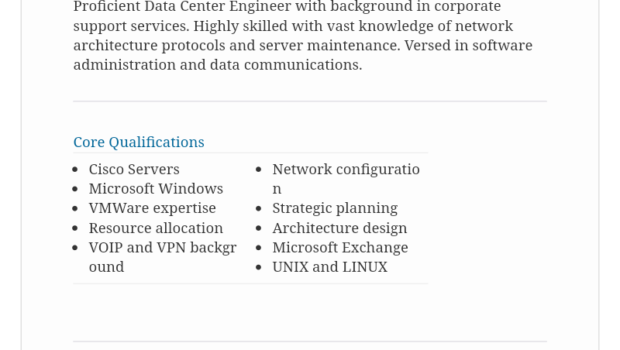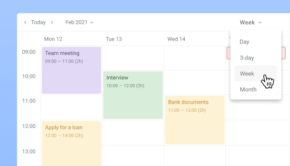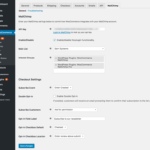6 Tips On Writing a Killer Data Center Engineer Resume
There have been more and more job opportunities for data center engineers in recent years. While this is great news, it also means that there are a lot of people competing for the same job. If you are one of data center engineers looking for a job now, you are probably wondering what it takes to get it.
The answer is quite simple – write a good resume. Throw the old one away and start fresh, make it breathe with character. Optimize it for the specific job you are applying to and add only the most relevant details.
If you still feel like you could use some pointers, here are our tips on writing the best data center engineer resume.
1.Format properly
Readability and ease with which someone can understand what you have to say is one of the keys to a high quality resume. Additionally, format matters in a job where small details matter a lot. This is why your formatting – if done poorly – can ruin your chances of getting a job.
To get your dream job, make sure that you choose one resume format like reverse technological because it highlights your best traits first. Then, focus on making your resume readable and visually appealing.
Write big headings and choose a font scheme that’s not too plain but also not too ornate. Think of the white space as your friend. The more of it the recruiter sees, the better your chances of getting that job are. To achieve this without sending in a white page, use plenty of short paragraphs and bullet point lists that will make your information easier to comprehend. You have the power to grab and move the attention of the recruiter and you can do this by formatting.
Bullet point lists are also something you should focus on. If you have a lot of achievements in your education or experience section, list them and try to keep it to a maximum of three bullet points.
You can even use some colors in your resume to make certain elements pop. However, try to stick with one base color and one accent color – you don’t want to come off as a preschooler.
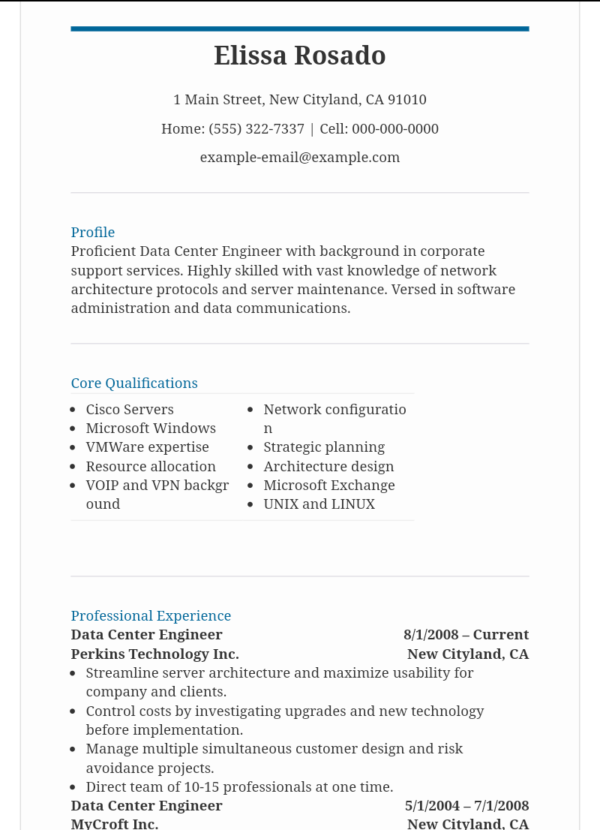
2.Write an attention grabbing summary
With a stack of dozens – hundreds in some cases? – resumes, yours isn’t going to get more than a few seconds. If you don’t impress right then and there, the job is gone. This is why you should include a summary, otherwise known as the overview.
This is a small paragraph of up to five sentences including some of your greatest achievements. You only get a limited amount of space and you have to make it count.
Some people list their skills, education and so on in short. There is nothing wrong with that and it may seem like a professional choice at the time. However, stack about 200 of resumes and it will be like an infinite loop of ‘Experienced data center engineer with skills in…’
To stand out, add some meat to that information. Present then with percentages of your effect in your previous companies, with your achievements and goals. Include as much quantifiable data as you can because that will justify what you say are your best skills and also show them why they should hire you.
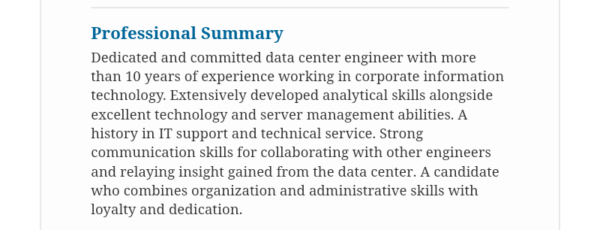
3.Companies care about experience a lot
One of the key things the hiring manager will look at is your experience. And they will prefer it over education and other sections because this one gives a clear picture of what you are worth. It shows them how you assisted in making other companies more successful.
However, most people don’t do this section properly. For one, they list all of their previous jobs. A better technique is that if you have had a lot of jobs, you only list the relevant ones. Add a few bullet points to each job and make sure to list meaty, meaningful information on those jobs.
Tailor your resume to the job each time you apply. This will make the information more relevant and possibly more appealing to the recruiters.
Also, it’s a good idea to have a career summary where you’ll show them how you have advanced and grew.
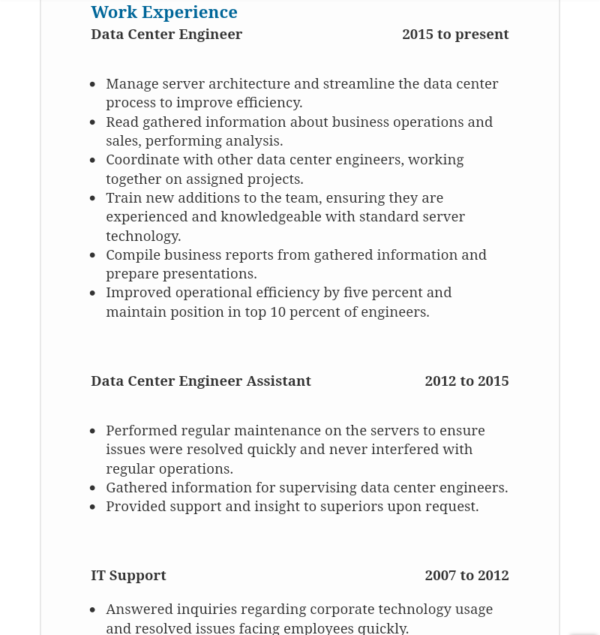
4. Tools to help you write
Everyone could use some help from time to time. It’s understandable if you are not a very good writer – just try to find a writer who is also a data center engineer. If you need some help, check out some of these tools:
- ViaWriting and StudyDemic: Grammar can be boring to deal with especially if you have more important things to do. For a quick check, use these resources.
- Elite Assignment Help and UKWritings: Proofreading takes a lot of time and often, you just don’t want to deal with it.
- Let’sGoAndLearn and MyWritingWay: If you are ever in need of some guidance in your career or simply with learning about new resume writing trends, these are the blogs to look at.
- Academized and OXEssays: Allowing an editing tool to change your resume can be hard but with these two you can be sure.
- Writing Populist and SimpleGrad: Writing isn’t an easy job and even the biggest professionals sometimes make mistakes. Look for some help from these writing guides.
5. Use the education section
Education section often looks something like this:
College name
Degree
GPA
But there is much more to it. You can use this section to improve your chances of getting hired. You were probably involved in some projects during your school time – include them. Don’t make this section bland and uninteresting. Adding college or high school projects can add flair and an advantage to your resume.
If you don’t have any formal education, don’t fear this section – recruiters are well aware that people who are self educated can do a better job in some cases than those with formal education. List your courses and means of education – whatever they may be – and add projects that you worked on as well.

6. Listing skills
This is where most people get it wrong. Because of this, all resumes end up looking alike. You have probably made it too.
First mistake is adding generic, buzzword skills like ‘responsible’, ‘team player’ and so on. “Everyone does this when actually proving that you are all of those things could be much better. Instead of just saying ‘team player’ let then know what your performance was leading or being a member of a team. Instead of ‘hardworking’ show how your hard work improved a company or a project,” says Tabitha Johnson, a resume editor at TopCanadianWriters.

Instead of just adding a programming skill, show what you did with it. Rather than saying that you’ve worked with big data, give them proof. A word doesn’t mean anything unless it’s supported by proof. Follow the rule of ‘show, don’t tell’ and let them make a conclusion based on your work.
The second mistake is adding irrelevant skills. Read the job description thoroughly before deciding which skills are best to add.
Parting Words
Writing a resume can be hard but with these tips it should get a bit easier. Just keep in mind the simple rule of storytelling ‘show, don’t tell’ and you’ll come off as much more impressive and you’ll have much better chances of getting your dream job.

